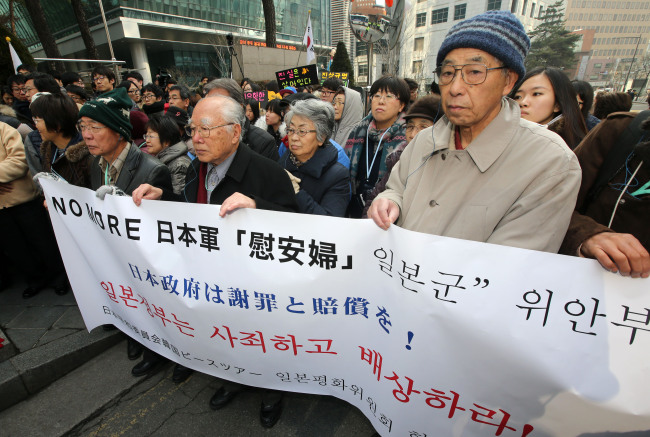More than half of college students in Japan thought the historical viewpoint of their Prime Minister Shinzo Abe needed adjustment to improve the country’s relationship with Korea, a survey showed Wednesday.
 |
| A group of elderly citizens from Japan call for their government to apologize to the “comfort women” at a weekly rally in front of the Japanese Embassy in central Seoul on Wednesday. (Yonhap) |
About 50.4 percent of Japanese students took issue with Abe’s denial that the Japanese military had forcibly turned women in Korea and other Asian countries into “comfort women,” a euphemism referring those coerced into sexual slavery by Japan during World War II. The survey by Seo Kyoung-duk, professor of general education at Sungshin Women’s University, was conducted on 250 students from South Korea and another 250 from Japan.
Only 18 percent of Japanese students said Abe was “headed in the right direction” while another 18 percent said his approach was “controversial but inevitable for Japan’s future.” Some 13.6 percent called it a “failed policy.”
Students from both South Korea and Japan thought their discord in history-related issues like comfort women and the South Korean islets of Dokdo was the biggest hindrance in the relationship between the two countries ― 78.4 percent of the former and 46.4 percent of the latter saying so. But 19.2 percent of Japan’s youth said Abe’s political stance was the biggest obstacle.
“Japanese students’ discontent with Abe was not something I anticipated. It showed that the current (Japanese) administration may not be as popular as it claims to be,” said Seo.
Abe’s administration has attempted to whitewash Japan’s wartime atrocities like comfort women, one of the thorny issues in South Korea-Japan relations. It recently asked a U.S. textbook publisher to revise its description of Japan’s sexual enslavement of some 200,000 Asian women.
His attempt backfired when the publisher shot down the request and said “scholars are aligned behind the historical fact of comfort women.” U.S. Congressman Mike Honda even called Abe’s tactics “an act of nonsense.”
But Seo’s survey also showed that students from two countries had different thoughts on comfort women. Although 94.4 percent of Koreans said Japan needs to apologize and compensate for the comfort women issue, only 32.4 of Japanese agreed.
Some 37.6 percent said Japanese government has already compensated sufficiently for its crimes.
“I was surprised to see that such high a number of Japanese students thought their government had done enough for the comfort women,” Seo said. “The results showed that Japan’s distortion of history was even more severe than I’d anticipated.”
Among possible measures to close the widening gap between the two countries, joint historical research was the most popular choice among students of both countries, with Koreans at 58.4 percent and Japanese at 32 percent. It was followed by a South Korea-Japan summit, more exchange in the private sector, cultural exchanges and economic cooperation.
By Yoon Min-sik (minsikyoon@heraldcorp.com)

